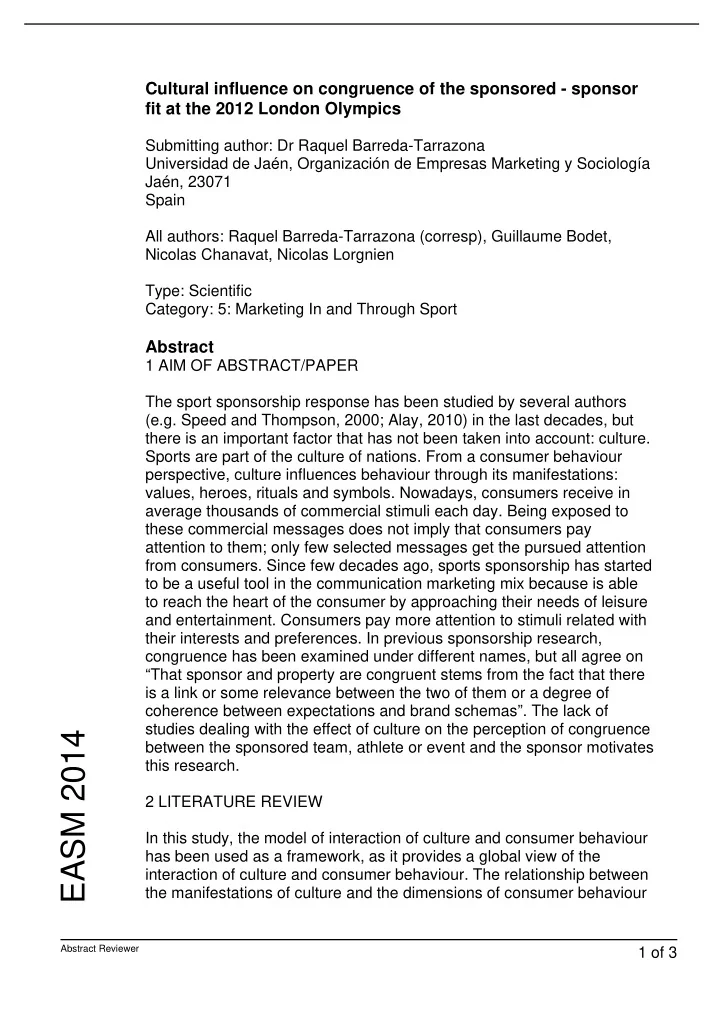

Cultural influence on congruence of the sponsored - sponsor fit at the 2012 London Olympics Submitting author: Dr Raquel Barreda-Tarrazona Universidad de Jaén, Organización de Empresas Marketing y Sociología Jaén, 23071 Spain All authors: Raquel Barreda-Tarrazona (corresp), Guillaume Bodet, Nicolas Chanavat, Nicolas Lorgnien Type: Scientific Category: 5: Marketing In and Through Sport Abstract 1 AIM OF ABSTRACT/PAPER� � The sport sponsorship response has been studied by several authors (e.g. Speed and Thompson, 2000; Alay, 2010) in the last decades, but there is an important factor that has not been taken into account: culture. Sports are part of the culture of nations. From a consumer behaviour perspective, culture influences behaviour through its manifestations: values, heroes, rituals and symbols. Nowadays, consumers receive in average thousands of commercial stimuli each day. Being exposed to these commercial messages does not imply that consumers pay attention to them; only few selected messages get the pursued attention from consumers. Since few decades ago, sports sponsorship has started to be a useful tool in the communication marketing mix because is able to reach the heart of the consumer by approaching their needs of leisure and entertainment. Consumers pay more attention to stimuli related with their interests and preferences. In previous sponsorship research, congruence has been examined under different names, but all agree on “That sponsor and property are congruent stems from the fact that there is a link or some relevance between the two of them or a degree of coherence between expectations and brand schemas”. The lack of studies dealing with the effect of culture on the perception of congruence EASM 2014 between the sponsored team, athlete or event and the sponsor motivates this research. � � 2 LITERATURE REVIEW� � In this study, the model of interaction of culture and consumer behaviour has been used as a framework, as it provides a global view of the interaction of culture and consumer behaviour. The relationship between the manifestations of culture and the dimensions of consumer behaviour Abstract Reviewer 1 of 3
is bidirectional. As Luna and Gupta (2001: 47) state, “individuals' cultural value systems are developed over time as they are socialized into a particular group”. Countries are particular groups, especially when they compete in a sporting event. That is the reason for expecting differences among countries.� � The framework for Sports Sponsorship Response (Speed and Thompson, 2000) has been used to analyze the perception of congruence of sponsorship. This framework is built of items related to three factors: the attitudes toward the event, the attitudes toward the sponsor, and the perception of congruence between sponsor and event. These three factors affect the response to sponsorship.� � As shown in previous research, the congruence between spokesperson and product type results in the perception of higher believability and attractiveness of the spokesperson and a more favourable product attitude (Kamins and Gupta, 1994). In this research, congruence of the binomial sponsored-sponsor is analysed in a cross-cultural framework. Some evidence about perceived differences in celebrity endorsements have been found between India and United States (Somdutta et al., 2009). For that reason, in this study, differences among countries perception of congruence are expected.� � Hypothesis: Response to the sports sponsorship will be different among people having different cultural background.� � 3 METHODOLOGY, RESEARCH DESIGN AND DATA ANALYSIS� � In this research a major event, the London 2012 Olympic Games, has been chosen in order to test the hypothesis. Data have been collected before the Games took place (three months) through online questionnaires, obtaining a sample of 488 respondents from four countries: France (128), Spain (90), United Kingdom (146) and United States of America (124). � � The data analysis has been done with the statistical software SPSS 19. The recognition variables are dichotomous; hence, they have been tested for differences among countries with the chi-square test. The EASM 2014 variables interest in sport and interest in the event have been tested with one-way ANOVA, as they are categorical variables. For all the constructs, factorial analyses have been performed. The Cronbach alpha has been estimated for each construct, and the arithmetic mean has been calculated in order to carry on ANCOVA analyses.� � 4 RESULTS, DISCUSSION AND IMPLICATIONS� � To sum up, in this paper culture has been analysed in order to measure its impact in the perception of congruence. From the obtained data, it can Abstract Reviewer 2 of 3
be assumed that cultural dimensions have some effect on congruence perception. But the most important effect that has been expected, the effect of culture on the sponsorship response in terms of interest, favourability and use of sponsor’s products has not been different depending on the country. From previous research, the difficulty to transfer the goodwill of the sponsor to the audience has been discussed when such an important event is sponsored. References Alay, S. (2010). Sponsorship evaluation scale (SES): A validity and reliability study. South African Journal for Research in Sport, Physical Education and Recreation, 32(2), 1-12. � Kamins, M.A. & K. Gupta (1994). Congruence between Spokesperson and Product Type: A Matchup Hypothesis Perspective. Psychology & Marketing, 11(6), 569-586.� Luna D. & S. F. Gupta (2001). An integrative framework for cross-cultural consumer behaviour. International Marketing Review, 18(1), 45-69.� Somdutta, B., Mahmood, H. & K. O'Donnell (2009). Celebrity Endorsements in Advertisements and Consumer Perceptions: A Cross- Cultural Study. Journal of Global Marketing, 22(2), 121-137.� Speed, R. & P. Thompson (2000). Determinants of Sports Sponsorship Response. Journal of the Academy of Marketing Science, 28(2), 226- 238. EASM 2014 Abstract Reviewer 3 of 3
Recommend
More recommend